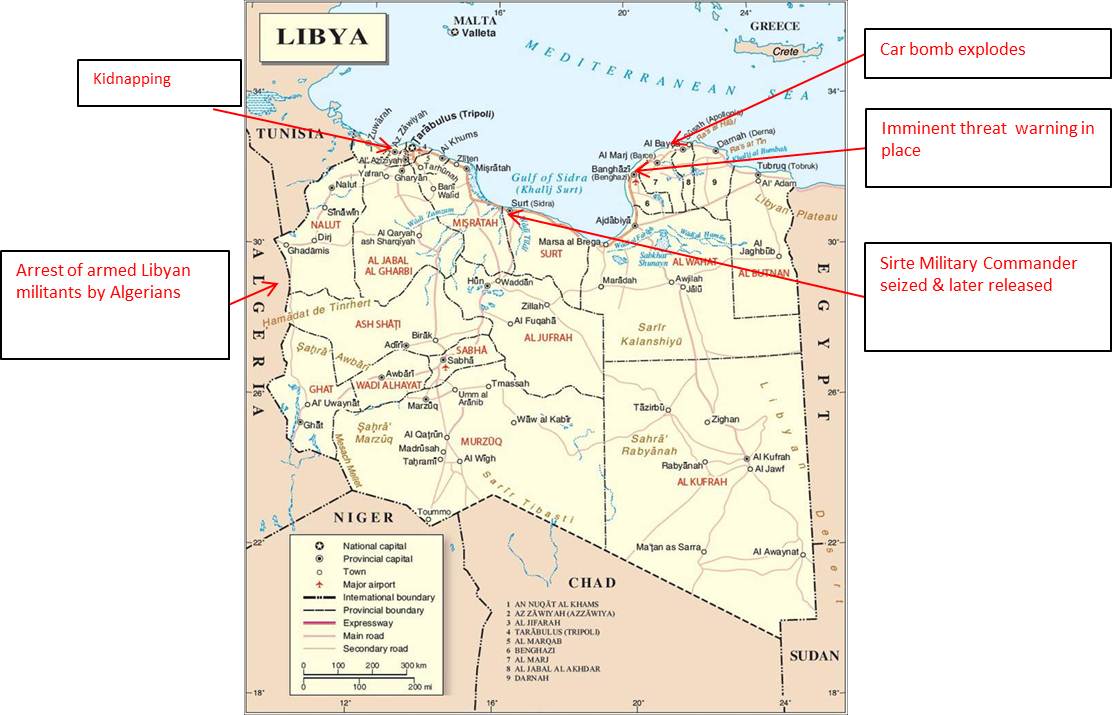By James Hopkinson, Director of Assaye Risk.
(Please click in map to view.)
Again this week regional issues have overshadowed internal security issues within Libya itself. This time it was Tunisia and the assassination of Chokri Belaid, leader of the secular Democratic Patriotic Party and outspoken critic of the ongoing Islamist-inspired political violence and Ennahda party, the ruling moderate Islamist party. He was shot dead on Wednesday as he was leaving his home in Tunis.
Reaction has been widespread within Tunisia leading on Friday to their first General Strike since 1978 as Belaid was laid to rest. Thousands of Islamists took to the streets on Saturday in a show of strength in response to Friday’s secularist marches.
The Ennahda Prime Minister, Hamadi Jebali, in the aftermath on Wednesday spoke of dissolving his cabinet and replacing it with technocrats with elections to follow shortly thereafter. Since then Jebali has appeared to row back from wholesale replacement of his cabinet to that of a few cabinet ministers being replaced by technocrats.
The situation remains tense and like events in Mali, Algeria and Egypt can impact on Libya and its fragile dynamics.
This coupled with the upcoming 15-17th February anniversary of the revolution makes it a potentially difficult time for Libya in the near term with security likely to be heavy and stepped up in the major cities.
Separately this week the International Criminal Court ordered Libya to hand over Abdullah al-Senussi, Gaddafi’s spymaster, for trial in The Hague.
And finally, France has announced that it will be holding a conference on 12th February to examine how it and other Libya-supportive countries and institutions might help it with its security, justice and rule of law issues.
Tripolitania and Tripoli
Concern has been expressed this week by the General National Congress following the breaching of its security by wounded Thuwars with a resultant spat emerging between the Congress and the Ministry of the Interior. Security for the Congress is provided by the Presidential Guard rather than MoI forces. What the incident shows is the confusion over the roles and responsibilities of the security architecture and its various organs.
The level of violence this week in the West has been more stable. Despite that there was a kidnapping in Zaiwa and then the seizure of the Sirte military commander by the Zaiwa Martyrs Brigade following a firefight. Colonel Omar Abdessalam Al-Hasnawi was later released but the incident continues to show the tensions between the various militias and the Government’s security officials.
The porous nature of Libya’s (and others) borders was shown again this week with the arrest of four armed militants by Algeria; two Libyans were picked up in the In Amenas region and two further south towards its border with Mali. The easy movement by armed bands across the borders is a major concern for all the region’s countries but no more so than for Libya with its vulnerable southern oilfields. BP is continuing to review its plans to restart drilling in Libya at the end of the 2nd Quarter.
Finally, Lufthansa has stopped its flights into Tripoli as a result of concerns over security. Alitalia is also planning to stop its flights into Tripoli over the revolution anniversary period of 15-17th February.
Gulf of Sidra, Cyrenaica and Benghazi
The travel advice for western citizens to avoid all travel to Benghazi from their governments remains in place due to an unspecified imminent threat.
Both the President of the General National Congress, Mohamed Magrief, and the Prime Minister, Ali Zeidan were in Benghazi during the week for discussions on security over the anniversary period when there are concerns about Cyrenaican federalists protesting and also the potential for salafists to hijack the occasion.
Earlier in the week 9 Syrian refugees were arrested in Benghazi by security forces for possession of bomb making literature. This follows tensions between the Syrian refugee community and local Benghazis.
Further up the coast to the east a car bomb exploded in Beida on 8th February near to security forces headquarters wounding 3 people. On a positive note in Beida there was also a symbolic handing in of some 100 small-arms weapons by the Misrata Martyrs Brigade.





